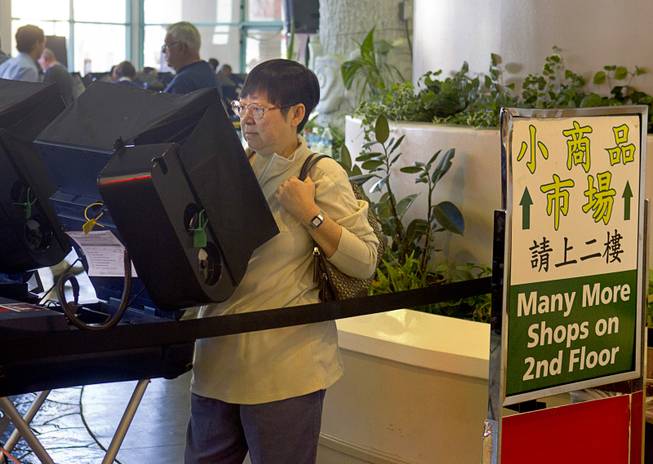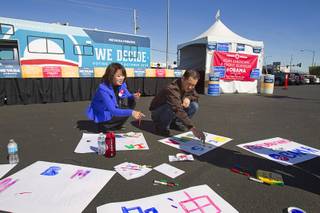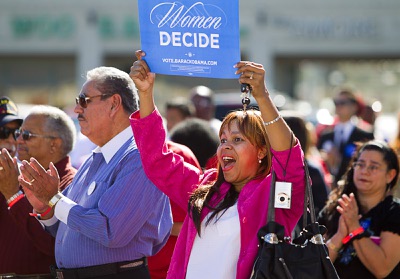
A woman casts her ballot at an early voting site at the Chinatown Mall on Saturday, Oct. 27, 2012.
Tuesday, Oct. 30, 2012 | 2 a.m.
Sun archives
- Organizations unite to bring minorities to the polls (8-4-2012)
- Asian-American vote cannot be ignored (7-18-2012)
Sun coverage
At almost 10 percent of the population, Nevada’s Asian-American community easily has the numbers to bridge the narrow gap of votes that likely will determine whom the Silver State selects as president and in many of the congressional races.
But as the campaigns move to seal the deal with the groups they have spent the past six months courting, Asian-Americans are feeling like an afterthought.
“They always talk about the Hispanics and the African-Americans, and that’s fine — but we’re almost a quarter-million,” said Mike Vaswani, president of the Asian American Group, Las Vegas’ largest Asian-American organization. “We’re like everybody else; we care about the same issues. But we don’t see the candidates as often as they court the other groups. It’s disturbing — for the most part, we see you only in election years.”
Nevada’s Asian-American community is, in many ways, the state’s best-kept political secret. They are the fastest-growing minority population in the state, now second only to Hispanic-Americans in numbers. And for the most part, no party has conclusively claimed them.
“In many ways, they are your ultimate swing voter population,” said S. Karthick Ramakrishnan, a professor at the University of California, Riverside and lead author of the 2012 National Asian American Survey, which found that a month before the election, 28 percent of Asian-American voters still were undecided — almost four times the national average. “They’re still up for grabs.”
Lately, Asian-Americans have split about 60 percent to 40 percent, favoring Democrats over Republicans.
But, historically, the population hasn’t been loyal to one party over the other: Twenty years ago, only a third of Asian-American voters were voting Democrat, and it was only in the past decade that Democrats began to claim the majority of the population’s vote.
The trend in their direction has led Democrats to believe they have a natural advantage in the community.
“We’re doing everything we can to get (Asian) voters out to the polls. ... They’re certainly becoming less of a minority and part of our overall message,” said Aoife McCarthy, Nevada spokeswoman for President Barack Obama’s campaign. “We’re trying to make sure that every bloc of voters is aware of what President Obama has actually done for their community and what his record has been. Whether it’s small-business owners, doctors, nurses or teachers, the president doesn’t have any lack of record to rely on.”
But the history of political parity, and the current economic climate, have Republicans thinking this might be the year to secure a larger portion of the Asian-American vote.
“This community is very conservative with the direction of the economy and how hard Nevada has been hit. ... These are people who are very aware of the implications that higher taxes and regulations have on people,” said Mason Harrison, Nevada spokesman for Republican candidate Mitt Romney. “Our message resonates with this community because we are campaigning on our vision of strengthening the economy.”
Ask members of the Asian-American community, however, and it’s clear that neither party has a lock on their vote.
Outside a polling station in Chinatown last weekend, Asian-American voters in Las Vegas presented a slate of issues on which they were looking to the candidates for answers and expressed a range of political opinions.
“Immigration issues are a big one for the Asian community. People look at that and think it’s solely a Latino issue, but it’s not,” said Lisa Drake, a Filipino-American who voted for Obama and Democratic U.S. Senate candidate Shelley Berkley.
Filipinos currently have the longest wait period — about 20 years — for a green card, a situation that has driven many to come to the country without papers and led many American-born Filipinos, such as Drake, to support the Dream Act.
But it’s not the only issue on Asian voters’ minds.
“No. 1 is the budget,” said Dan Uaje, a Filipino who voted for Romney and Republican Sen. Dean Heller. “We can’t spend more than what we are earning.”
“Health care — that is the No. 1 concern,” said Topsy Ho, a small-business owner in Chinatown, who voted for Obama because of Obamacare.
“Look there — all the restaurants, how many — all of them don’t have health insurance, but all of them are working class,” Ho said, pointing to a row of stores on Spring Mountain Road. “They’re working hard for their life, for their family ... working-class people, they probably work 10 years, they’re lucky if they save $50,000, and when they get sick, it’s all gone.”
Health care was on the mind of many Asian-American voters visiting the polls this weekend. But while many agreed on which issues were most important, they disagreed widely about which candidate offers the best solutions to address it.
“I decided to vote because of health care; the medical bills in this system are totally screwed up,” said Euijung Muscat, a Korean immigrant and first-time voter who cast her ballot for Romney. “I’m working in a casino and half of my paycheck goes to premiums for health insurance — it goes up every year, and someday it’s going to be my whole paycheck. So that was the main reason I decided to vote.”
In addition to immigration and health care, the Asian-American community also ranks jobs and education as top priorities, according to surveys. Many Asian-American voters are small-business owners and have college aspirations for their children.
“It’s hard to divide,” said Terry Wong, president of the Asian American Chamber of Commerce and an American of Chinese descent, who is registered Republican but says he votes a mixed ticket. “On the one hand, you have entrepreneurism in the community, and that seems in line with Republican thinking. But on the other hand, there are civil rights issues that come with being a minority, and there you want to lean more toward Democratic thinking.
“If you’re a Republican, you have to think about Medicare and education,” Wong said. “And if you’re a Democrat, you have to think about business as well.”
Wong said he’s noticed a slight uptick in the attention candidates have been paying to the Asian-American community in Las Vegas compared with previous years, something he credits to the increased economic power of the community despite the recession.
“I think you’re seeing a lot of growth of the Asian-area corridor along Spring Mountain (Road) between Rainbow and Valley View. And with growth comes numbers (of voters),” Wong said. “So it’s a sector of the population that needs to be addressed.”
Vaswani also said that Asian-Americans have more money to donate to politicians than other minority groups. But, he said, only some are directly soliciting the community for their support and their votes.
“We do a whole bunch of events. Shelley Berkley and Dina Titus, they’ve been there for years; they come to all our events. But the Republicans never turn out. I don’t know why,” Vaswani said, complaining he’s “never seen” Heller. “Except the Republican governor and Joe Heck, they are the exceptions.”
Republicans said all their candidates had been reaching out to Asian-American voters and suggested there was no reason for the community to feel snubbed by certain candidates.
“We all work together. We’re pooling our efforts and resources,” said Darren Littell, a spokesman for Nevada Republicans, who cited Mari Nakashima St. Martin as a face for the party with the Asian-American community. “When Mari’s out there reaching out to that community, it helps Romney, Heller and Heck. When Congressman Heck is reaching out to that community, it also helps Mari and Heller.”
Democrats scoffed at the notion that Republicans have made similar inroads with the community as Democrats have.
“Obama has doubled the number of Asian-Americans sitting on federal benches. He has three Cabinet members that are (Asian-American/Pacific Islander) members,” McCarthy said. “This administration is inclusive ... and that’s something that’s really important. Regardless of what community you’re talking to, every community has a voice at the White House and within the Cabinet.”
The Asian-American community is a diverse group.
In the Las Vegas area alone, the Asian-American and Pacific Islander community is composed of sizable populations of Filipinos, Chinese, Koreans, Indians, Pakistanis, Sri Lankans and Vietnamese — and they don’t always vote as a bloc.
While many ethnicities have been trending Democratic in recent years, Filipino-Americans, Las Vegas’ largest Asian-American community, have begun trending Republican. Four years ago, Filipinos favored Obama over Sen. John McCain by 6 points nationally; this year, Ramakrishnan said, polls show Filipinos prefer Romney over Obama by a similar margin.
“It’s a very close race,” said Cynthia Deriquito, secretary-treasurer of the Filipino-American Political Organization With Equal Representation, founded earlier this year. “Some (voters) are changing parties, some are leaning toward being nonpartisan. People are often undecided until the last minute.”
Deriquito said the community stepped up its voter registration efforts this year, a push that was aided by the fact that 2012 is the first year Tagalog is one of the languages on the ballot.
Candidates also are engaged in a concerted battle for those new voters. Earlier this year, for example, Berkley's and Heller’s campaigns had a public spat about the legitimacy of each other’s endorsements from rival Filipino-American organizations.
Filipino community leaders say the split is a good thing, even if it makes sorting out the politics a little confusing.
“I think it’s an advantage because then the politicians pay attention,” Deriquito said. “They realize that you’re nonpartisan ... then they know they can sway you.”
Deriquito and others said that the most effective way to drive the Asian-American vote continues to be direct contact, which of course is the thing that community leaders complain is the most lacking.
“Percentage-wise, this is an untapped market,” Wong said. “In order to get the community more involved, you need to have more individuals within the community to be advocates ... so more grassroots work, more advertising within the communities.”
Nonetheless, a striking number of Asian-American residents of Las Vegas said they were happy to be somewhat ignored as members of the Asian-American community because it means they simply were blending in as fully assimilated Americans.
Wen Guo, who originally is from China, explained that while she hasn’t been targeted in this election as an Asian-American, she certainly hasn’t noticed any lack of attention from the campaigns — in fact, in the past few weeks, she said, she’s been inundated with phone calls from the campaigns and canvassers knocking on her door.
“They’re not talking about us as Asians per se,” Guo said. “I think it’s a good thing. I don’t think they have to.”



Join the Discussion:
Check this out for a full explanation of our conversion to the LiveFyre commenting system and instructions on how to sign up for an account.
Full comments policy